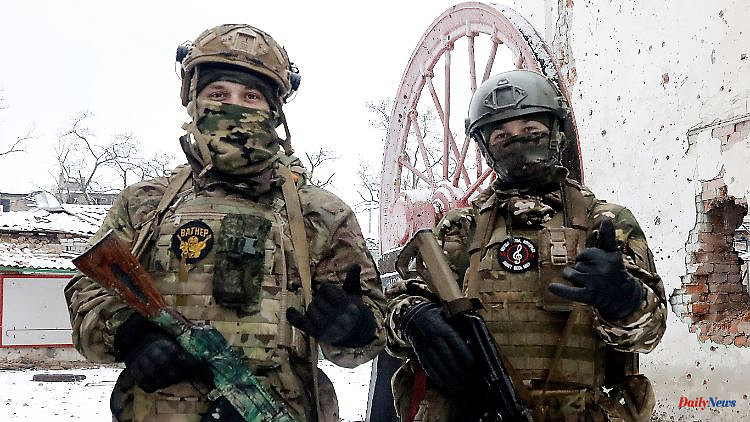In videos from the front, Wagner fighters complain about the lack of artillery ammunition. That would lead to a high number of victims and jeopardize previous successes. They request supplies from the Russian Defense Ministry. Are Prigozhin's mercenaries being deliberately slowed down?
A power struggle has been raging between the Russian Ministry of Defense and Wagner boss Yevgeny Prigozhin for months. Due to current complaints from several fighters in the mercenary force about a lack of ammunition deliveries, this receives new food. In a video shared via the Wagner Telegram channels, four fighters who describe themselves as the Wagner Group artillery unit can be seen lamenting the acute shortage of grenades and other projectiles. Another video shows a warehouse in which numerous dead Russian fighters, presumably also Wagner mercenaries, are laid out - some in plastic bags, some in coffins.
Two men dressed in protective suits speak of a high number of casualties, citing the lack of ammunition as the reason for this. Both videos claim that the supply of further ammunition is currently completely cut off. Among other things, there is a lack of shells for howitzers and ammunition for T-72 tanks, the most frequently used tank model in the Russian armed forces. The fighters urge the Russian Ministry of Defense to supply more ammunition: otherwise, many fighters would continue to die and the success of the units would be jeopardized.
The criticism of the Russian defense ministry was orchestrated by Wagner founder Prigozhin himself. On his Telegram channel, he railed against "corrupt bureaucrats" and claimed that they were trying to "kill the Wagner group." Russian war bloggers also demand that the Wagner group in particular must be supplied with grenades, since their success will determine the progress of the war.
In fact, the Russian successes of the past two months have been achieved almost exclusively in the Bakhmut region. The Wagner group is particularly active there. On other front sections, on the other hand, hardly anything is moving. Bachmut and Soledar have been in focus since the conflict broke out in 2014. Neither the pro-Russian separatists have managed to make a real breakthrough there since, nor the regular army after the February 2022 invasion of Ukraine.
Only in the past few months was the Wagner group able to conquer the town of Soledar and advance towards Bachmut. Some Wagner fighters are already in the outskirts of the former 70,000-inhabitant city. The offensive there has also been stagnating for a good week, which Prigozhin explains, among other things, with the lack of ammunition. He had already had to get ammunition from a Chechen commander. However, this is not a permanent solution to the problem.
Recent Russian successes have only been made possible by a heavy toll in blood. It was not without reason that Wagner founder Prigozhin recruited around 40,000 men in Russian prisons. Often poorly trained and not particularly well equipped locally, they were promised freedom after six months of service in Ukraine. On site, it was their task to expose Ukrainian defense positions and to betray their locations to the Russian artillery by permanently attacking in waves.
The army was then able to cover the positions of the defenders with projectiles over a large area. However, this strategy was associated with immense losses among Wagner fighters. Current figures suggest that around half of the Wagner fighters did not survive their deployment in Ukraine. The casualty figures of other Russian associations are said to be low in comparison. In addition to the high personnel costs, the artillery plays a decisive role in the success of this war tactic. This also explains the massive criticism at the moment.
It is questionable whether the group was deliberately cut off from supplies. Ukraine, meanwhile, is again increasingly targeting the invaders' supply line - trying to hit warehouses, trains, railroad tracks, roads or convoys. And regular Russian troops also complain about a lack of ammunition. Western experts have found that the Russian army has recently made significantly less use of artillery - apparently also because the Kremlin was preparing larger offensives, for example in the Kreminna region. This may also apply to the previously well-equipped Wagner group.
According to the US think tank Institute for the Study of War (ISW), however, it could also be a warning signal from the Ministry of Defense and the Kremlin to Wagner founder Prigozhin, who has recently received increasing praise from political hardliners and nationalist nationalists for the successes of his fighters war bloggers received. Prigozhin went public more often, denouncing mistakes by the Defense Ministry and indirectly by Russian President Vladimir Putin, and after setbacks called for the dismissal of generals.
Observers attest to Prigozhin's political ambitions. With every success, the 61-year-old appeared more demanding and self-confident. This met with little enthusiasm, especially in the Russian military apparatus. A reduction in supplies could actually be an attempt to put Prigozhin and his Wagner group in their place. Another indication of this is that the recruitment of Russian prisoners is said to have been stopped recently. Prigozhin had also publicly complained about this.












